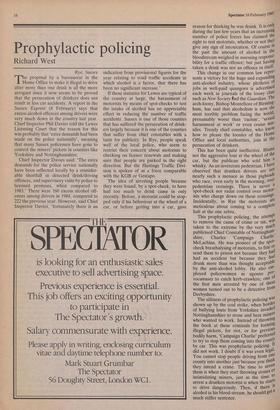Prophylactic policing
Richard West
Rye, Sussex The proposal by a bureaucrat in the Home Office to make it illegal to drive after more than one drink is all the more arrogant since it now seems to be proved that the persecution of drinkers does not result in less car accidents. A report in the Sussex Express (8 February) says that excess alcohol offences among drivers were very much down in the country last year. Chief Inspector Phil Davies told the Lewes Licensing Court that the reason for this was probably that 'extra demands had been made on the police nationally', meaning that many Sussex policemen have gone to control the miners' pickets in counties like Yorkshire and Nottinghamshire.
Chief Inspector Davies said: 'The extra demands for the police service nationally have been reflected locally by a consider- able shortfall in detected drink/driving offences, and supervisory visits by police to licensed premises, when compared to 1983.' There were 160 excess alcohol off- ences among drivers in 1984, compared to 222 the previous year. However, said Chief Inspector Davies, 'fortunately there is an indication from provisional figures for the year relating to road traffic accidents in which alcohol is a factor, that there has been no significant increase.'
If these statistics for Lewes are typical of the country at large, the harassment of motorists by means of spot-checks to test the intake of alcohol has no appreciable effect in reducing the number of traffic accidents. Sussex is one of those counties that has suffered the persecution of drink- ers largely because it is one of the counties that suffer from chief constables with a taste for publicity. In Rye, people speak well of the local police, who seem to restrict their concern about motorists to checking on licence renewals and making sure that people are parked in the right direction. But the Hastings Traffic Divi- sion is spoken of as a force comparable with the KGB or Gestapo.
The idea of arresting people because they were found; by a spot-check, to have had too much to drink came in only recently. Before, a motorist could be stop- ped only if his behaviour at the wheel of a car, or before getting into a car, gave reason for thinking he was drunk. It is onlY during the last few years that an increasing number of police forces has claimed the right to test motorists, whether or not they give any sign of intoxication. Of course 10 the past the amount of alcohol in the bloodstream weighed in assessing responsl" bility for a traffic offence; but just having taken a drink was not an offence in itself.
This change in our common law repre- sents a victory for the huge and expanding anti-alcohol industry, whose plethora 01 jobs in well-paid quangoes is advertised each week in journals of the loony class such as New Society Ind the Guardian. The arch-loony, Bishop Montefiore of Birming- ham, has said that alcoholism is now the most terrible problem facing the world, presumably worse than 'racism', `sexual harassment at work' or even cruise mis- siles. Trendy chief constables, who know' how to please the loonies of the Home Office and local authorities, join in the persecution of drinkers. This has been quite ineffective. Blame not the aggressive lout at the wheel of the car, but the publican who sold him a whisky. As an inveterate pedestrian, I have . observed that drunken drivers are 0' nearly such a menace as those pighearla who race, even early in the morning, over pedestrian crossings. There is never a spot-check nor radar control over motor- ists who charge down on these crossing' Incidentally, in Rye the motorists are meticulous about coming to a complete halt at the one zebra. This prophylactic policing, the attempt to remove the cause of crime or sin, Os, taken to the extreme by the very much publicised Chief Constable of Nottingham; shire, Charles 'Campaign Charlie McLachlan. He was pioneer of the spot- check breathalysing of motorists, to fine or send them to prison not because they had had an accident but because they had drunk more than was thought acceptable by the anti-alcohol lobby. He also em- ployed policewomen as agentes pr°; vocateuses to catch 'kerb-crawlers; one °` the first men arrested by one of those women turned out to be a detective from Derbyshire. The silliness of prophylactic policing Was shown up by the coal strike, when hordes of bullying louts from Yorkshire invaded Nottinghamshire to stone and beat miners who wanted to work. Instead of throwing the book at these criminals for forming illegal pickets, for riot, or for grevil bodily harm, 'Campaign Charlie' preferred to try to stop them coming into the county by car. This was prophylactic policing. It did not work. I doubt if it was even legal' You cannot stop people driving from one county into another just because you than'. they intend a crime. The time to arrest them is when they start throwing stones or intimidating miners, just as the time t0 arrest a drunken motorist is when he starts . to drive dangerously. Then, if there is alcohol in his blood-stream, he should get a much stiffer sentence.














































 Previous page
Previous page